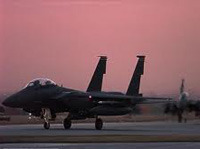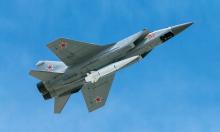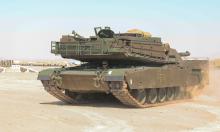Slobodan Milosevic deserves NATO's top honors
 March 24, 2011 marks another anniversary of the NATO bombing of Yugoslavia. The alliance eventually made Yugoslav President Slobodan Milosevic accept the conditions of the West and withdraw the Yugoslavian army from Kosovo. Noteworthy, those goals were achieved as a result of air warfare only. NATO's administration dismembered Yugoslavia without deploying ground forces in the country. It all happened with the help of missile and bomb attacks.
March 24, 2011 marks another anniversary of the NATO bombing of Yugoslavia. The alliance eventually made Yugoslav President Slobodan Milosevic accept the conditions of the West and withdraw the Yugoslavian army from Kosovo. Noteworthy, those goals were achieved as a result of air warfare only. NATO's administration dismembered Yugoslavia without deploying ground forces in the country. It all happened with the help of missile and bomb attacks.
The North Atlantic Alliance proved that Giulio Douhet's doctrine, which appeared as many as 100 years ago, had solid grounds. Douhet, an Italian general, believed that it was possible to achieve victory in a war through aerial warfare only.
In the USSR, the Douhet's doctrine was harshly criticized as a groundless theory. Nevertheless, Yugoslavia capitulated in June of 1999. Why did it happen? Why did the nation's air defense system prove to be powerless to NATO's air strikes? Pravda.Ru asked expert opinion from Alexander Khramchikhin, deputy director of the Institute for Political and Military Analysis.
"First off, one should point out NATO's qualitative and quantitative predominance. It is not the Serbian military, but the political administration of Yugoslavia, Milosevic, first and foremost, that must be reproached for the defeat in the war. The country entered the war with NATO at the time when it was armed with outdated anti-aircraft complexes and fighter jets. Most of them were made during the 1960s. The Americans had the experience of dealing with S-75 and S-125 systems in Vietnam and in other local conflicts before Yugoslavia. They knew how to destroy them when they attacked Yugoslavia. They also knew how to disable Yugoslavian radars."
"Are you saying that Yugoslavia could have been saved with S-300 systems? Many suggested the systems should be delivered to the Serbs in the spring of 1999, when the aggression had already begun. However, the systems are useless if the personnel is not trained accordingly."
"That's right. It was simply impossible to do that in March of 1999. When S-300 systems were being put into service in the USSR, the personnel had to study how to operate them, because those were absolutely new anti-aircraft complexes. The Yugoslavs did not have the time for it. If we had delivered S-300 systems to Belgrade, Russia would have been involved in a major war, as it happened in 1914.
"However, Milosevic had time to strengthen the security of his country, but he didn't use that time. Russia was prepared to deliver the systems to him during the second half of the 1990s."
"Why didn't he use that time?"
"Apparently, Milosevic hoped until the last moment that there would be no aggression. He thought it wrong. Moreover, this person, whom some people in Russia consider a hero, can be considered as such only for NATO. Milosevic betrayed his brothers in Croatia and Bosnia. He got his country involved in the deadly war with the West, and he capitulated in June 1999. He surrendered at the time when the alliance was about to begin the ground operation. If only it had happened, NATO would have suffered considerable losses in the war. He made a huge mistake when he decided to fight back with his bare hands. Then he made another huge mistake as he surrendered at a very bad moment. If he wanted to fight, he should have fought till the end. I do not understand what he was judged for. The man virtually handed Yugoslavia over to the West. He deserves NATO's top honors."
"You mentioned the ground operation on the Balkans. Does it mean that the actions of the coalition were not so good?"
"NATO's air forces originally had two goals. The most important one of them was to make Yugoslavia capitulate, to bomb the country into the Stone Age, so to speak. The secondary goal was to destroy the People's Army of Yugoslavia, especially its Kosovo wing. They succeeded in the first goal and failed in the second one. NATO destroyed all key objects of the Yugoslavian infrastructure, but failed to cause significant damage to the army.
"They learned several lessons from Operation Desert Storm against Saddam Hussein. They remembered how Hussein was using inflatable models of military hardware. NATO pilots would waste their missiles and bombs on them, whereas the real tanks and missile systems would be left untouched. According to Belgrade, there were tens of NATO planes downed. However, the Serbs showed the fragments of only two planes - F-117 and F-16."
"It was said in the press that at least one more F-117 plane was downed outside Yugoslavia. In addition, the Serbs showed the engine of American A-10 aircraft, which was supposedly downed above Kosovo. They showed only the engine, though. "
"It could be possible indeed that the Serbs downed one more plane. However, the number of destroyed targets can be determined with pure facts, not rumors. Even if it was really so, another downed F-117 does not change anything. The primary task of the air defense system is to protect the objects that the system was built to protect. As for A-10, the Serbs showed its engine indeed. Everyone thought that it was a destroyed target. However, the plane was hit, but it didn't crash, no matter how strange it may seem. The plane landed at a NATO air base. The A-10 is a heavy striker plane, designed in the USA to attack Soviet tank columns protected with anti-aircraft complexes and so on. In other words, the plane was designed to be unhittable, so to speak. Even if it looses one engine, it will be able to make it to the nearest airbase. This is what happened in this case. If the plane had been downed, the Serbs would have showed the rest of the plane."
"Some Russian military experts say that the Serbs did the things which the Iraqis could not do. They destroyed up to 30 cruise missiles and guided air bombs."
"There was no evidence provided to prove it. They could not provide it, because those missiles are considered lost. I can assume that the Serbs indeed managed to intercept some of them, but it does not change anything either. I'd like to repeat here that all the key targets were destroyed."
"Which are the main lessons of the Yugoslavian campaign of 1999?"
"First and foremost, NATO managed to prove that modern wars can be won in the air, that it is possible to achieve victory through airstrikes with minimum losses. The financial costs for the operation could be comparable to the costs of the damage which the Serbs suffered. One Tomahawk cruise missile costs $1 million, and NATO launched as many as a thousand of them, not to mention guided air bombs.
"Secondly, the campaign of 1999 showed that the aerial warfare is good for destroying small countries like Yugoslavia. As for larger enemies, an aggressor may not have enough resources to attack them from the air only. It will not be possible to avoid large-scale ground operations at this point.
"Finally, the sad Yugoslavian experience must teach other countries, including Russia, that one should take care of their armed forces every day."
Sergei Balmasov
Pravda.Ru
Subscribe to Pravda.Ru Telegram channel, Facebook, RSS!





